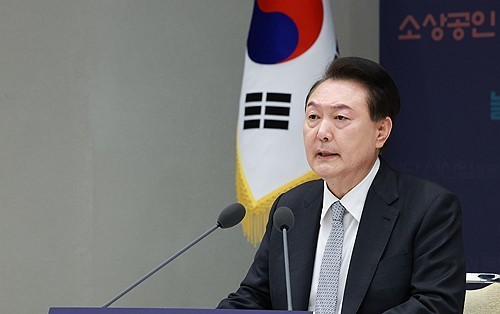Economy, scandals see President Yoon’s party go down in defeat in parliamentary elections
The Democratic Party of Korea, the main opposition force, wins 175 seats out of 300, coming close to a two-third supermajority that might have blocked the president's choices. Prime Minister Han Duck-so and other senior aides have resigned.
Seoul (AsiaNews/Agencies) – South Korea’s main opposition party has won a landslide victory in yesterday’s parliamentary elections. The result puts conservative President Yoon Suk-yeol in difficulty for the rest of his mandate, which ends in 2027.
Incumbent Prime Minister Han Duck-so and senior aides in the president’s People Power Party (PPP) tendered their resignation; for some analysts, the midterm election was a referendum on the Yoon administration.
The Democratic Party of Korea (DPK) won 175 seats out of 300, not far from a 200-seat supermajority, which would have allowed the National Assembly to veto the president's actions.
After the results were announced, DPK leader Lee Jae-myung, who lost to Yoon in the 2022 presidential election, said that the top priority will be to work towards economic recovery for the average consumer.
"This isn't the Democratic Party's victory but a great victory for the people," Lee said. “Politicians on both sides of the aisle must pool our strength to deal with the current economic crisis. The Democratic Party will lead the way in solving the livelihood crisis.”
In the months leading up to the vote, the Yoon administration had been struggling to deal with a number of issues, including rising food prices, a rapidly aging population, and a weeks-long strike by trainee doctors.
In the past few weeks, he was criticised for seeming unaware of the impact of rising inflation on South Koreans, most notably during a visit to a supermarket in the capital Seoul, when he said that 875 won (US$ 65 cents) for green onions was a "reasonable" price.
The item had been priced at a discount because of subsidies and would normally cost between 3,000 and 4,000 won. The opposition was quick to seize on the matter, with bundles of green onions used as props at campaign rallies.
However, for experts, it would be too simplistic to reduce Yoon’s defeat to a single issue.
In addition to the poor management of the economy, the PPP suffered from a spate of political and family scandals. One, in particular, involved Kim Keon-hee, President Yoon’s wife, who was accused of accepting an expensive Christian Dior bag from a Methodist pastor, in violation of South Korea’s anti-graft law.
Within the PPP, some members already at odds with Yoon, have left to create their own party.
In accepting defeat, Yoon vowed to "reform the state affairs" and "stabilise the economy”.
Some observers speculate that the conservative president, in order to divert attention from the country’s economic woes, might focus more on foreign policy, including boosting security ties with the United States and Japan.
However, in this policy area, Yoon might hit a wall if the opposition, which now has a large majority in the National Assembly, decide to cut defence spending, with a negative impact on the country’s commitment to its alliances.
12/02/2016 15:14
14/04/2022 18:19







.png)










